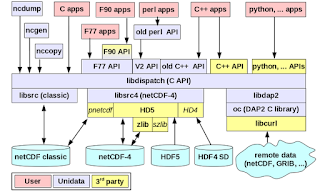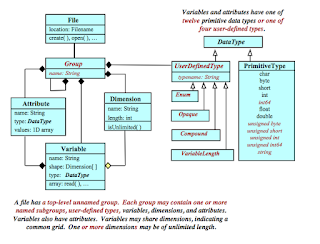The Development Process for NetCDF
What Management Style is used for the NetCDF Project?
NetCDF is a very successful free software package. It's used by NASA, NOAA, the ESA, and the IPCC, to list just a few. It's a global standard for weather and climate data, and also used in other sciences.
As such, the netCDF library is a critical piece of infrastructure for many very important software systems. It has performed reliably and well for more than 20 years, yet it has not remained static.
In the last 20 years new features include NetCDF-Java and a whole ecosystem of Java data tools, NetCDF-4 and HDF5 integration, remote data access with OPeNDAP, and the addition of large-file capable binary formats 64-bit offset and CDF5.
NetCDF continues to grow and evolve with the hardware and software that make up science data processing systems. It is as relevant for cutting edge computer science today as it was when introduced
You may well wonder about the development process used for this very successful project. You may also be amazed to learn that the netCDF team is very small - generally less than 2 full time people.
Demi-Gods of Programming
The development processes and environment under which netCDF is developed (along with many other successful tools), is the work of one mad programming genius, Russ.Russ' madness is well-documented, but few are aware of his contributions in the field of software development management.
Russ understood that some programmers are much more productive than other programmers. He conceived of the Unidata program center as a mountain-full of programmer demi-gods.
The Rules of Demi-God Programmer Management
I will distill Russ' ideas on programmer management into a few rules:
* everyone gets an office
* everything other than programming is optional
* if someone tells you to do something stupid, it's never your job to do it
* everyone else is too busy to tell you what to do or how to do it
* automation is always good
An Office for All
If you are programming, you need to concentrate. If you are being interrupted or bothered, you are not concentrating, therefore not programming.Therefor every programmer needs an office. No exceptions.
This is a crucial productivity booster. When programmers are doing heads-down coding, in a quiet environment, and are not interrupted, a lot more gets done.
You're a Programmer, Nothing Else
The dress code is "the holes in your pants can't match the holes in your underpants."A similar attitude was taken to most other aspects of the workplace. Whatever is not helpful for programming, is optional.
Monthly meetings were held and attendance was mandatory. Otherwise, every meeting was optional.
Don't Do Stupid Stuff
If you think something is stupid, don't do it. Do something else instead. Never do something stupid just because you were told to do so. Even if the person who told you is your boss, they don't really mean for you to do something stupid. So don't.Figure Out What to Work On
There are so many challenges with science data! There are more scientific instruments now than at any time in history, and they produce more data than has ever been produced before.If you can't figure out how to help, don't expect someone else to be able to tell you. Take a look at the problem space, and start coming up with solutions.
Automation is Our Friend
Anything we can automate is something we should automate. Unidata was using automated testing long before most organizations, long before the concepts of agile programming were articulated. Automated testing provides good testing with much less work.
On a project with major goals and challenges, we need to automate as much as we can, so that we can focus our efforts on moving the project forward.
The Result
The result of hiring a few good programmers, and providing this management style, was netCDF, (and many other advances in software for Earth science research software, developed at Unidata).I know this was not just netCDF, because the same style of management was applied to all Unidata projects and products, and they were often very successful.
Some projects didn't work out well, and sometimes the demi-gods could be difficult to deal with (just like the real demi-gods). But this style of management produced more quality software, with far less resourses, than I have ever experienced.




Comments
Post a Comment